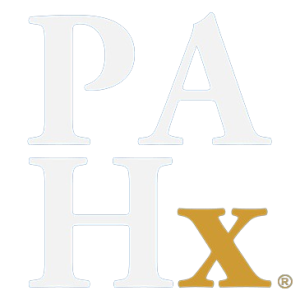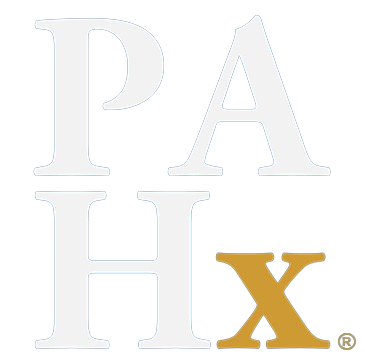PAHx Collection Development Policy
Archive, Library and Museum Collection Development Policy
The Society was established in 2002 to assure that primary source material documenting the physician assistant profession would be preserved and made accessible to scholars and future generations of physician assistants.

Introduction, History and General Purpose
The Society was established in 2002 to assure that primary source material documenting the physician assistant profession would be preserved and made accessible to scholars and future generations of physician assistants. To accomplish its mission, the Society developed strategies: (1) to advise organizations, institutions and individuals how they may best safeguard the record of their achievements using standard archival methods; (2) to conduct and collect oral histories documenting the growth and development of the PA profession over time; (3) to collect and present biographical information that honors those who have contributed to the PA profession’s success; (4) to identify and process institutional and organizational records and personal papers and selected archival, library and museum items that are unpublished, inaccessible or in danger of being lost unless the Society intervenes to assure the survival of these unique and priceless collections. As an adjunct to other repositories, the Society’s Archive, Library and Museum (ALM) Collection contains valuable primary source material useful to scholars, learners and policy-makers.
From 2002 to 2011, the Society’s noncurrent administrative records and special ALM collection were maintained at the Duke University Medical Center Archives and at the Eugene A. Stead, Jr. Center for Physician Assistants in Durham, NC. In August 2011, these holdings were transferred to the Society’s safekeeping at its current location in Johns Creek, GA.
General Subject Boundaries & Acquisition Priorities
The Society ALM Collection’s emphasis is historical and scholarly information about the physician assistant profession. Subject areas include but are not limited to: development of the profession, national professional organizations, early educational programs/models, credentialing (i.e. accreditation, certification, and licensing), professional development, key events of the profession and people.
Limitations on Acquisitions
Acquisitions of materials will take into account the mandates and policies of other (archival) institutions, the resources required to gain intellectual and physical control over the materials in a reasonable period of time, the legal rights of the donor to gift the materials, the extent and terms of any restrictions, the material’s relationship to the strengths and weaknesses of the existing collection, the availability of suitable storage facilities, and the physical condition of the materials. Due to the infeasibility of collecting all materials relating to the PA profession, as well as the undesirability of duplicating existing collections, administrative records of PA programs, PA professional organizations and International PA organizations are not subject for inclusion in this collection. Please contact our staff should you need clarification about the scope of acquisitions.
*Under no circumstance can the PA History Society accept any item that contains mold.
*The PA History Society has the right to deny acceptance of any item at their discretion.
Languages
English is the preferred language of the PA History Collection.
Chronological Boundaries
The bulk of the collection dates from the 1960’s to the present but there are no chronological limits for items that provide insight into the practice of team-oriented, health care services.
Geographical Boundaries
There are no geographical boundaries. While the majority of the collection is from within the United States, all areas will be considered for inclusion.
Types of Materials Collected
- Organizational Records (minutes, reports, correspondence, planning documents and internal publications)
- Personal Papers (correspondence, scrapbooks, personal items of interest to profession)
- Books or other published materials (dissertations, journals) *Only original copies of books or other published materials (articles, journal, dissertations, etc.) will be accepted. Unfortunately we cannot accept copied documents.
- Still Images (hard copy or digital photographs, slides, digital presentations) – Moving Images (film, video, DVD or other electronic format)
- Oral Histories (audiotape, videotape, transcripts)
- Artifacts and memorabilia (objects that bear directly on the history of physician assistants and are of significant historical and scholarly value and are of dimensions and materials that can be housed permanently in the Society’s current allocated space). *The PA History Society is no longer accepting personal awards, medals, plaques, and citations.
Format of Materials Collected
The materials stated above may be in a variety of formats, such as paper, electronic, audio-visual or digital media. When information exists in more than one format, preference is given to formats with known longevity.
Donations/Gifts, and Loans
Donations will be accepted provided that (a) legal ownership of the item or collection is transferred through a signed Deed of Gift, (b) the item is appropriate (falls within the subject boundaries and is appropriate for the collection) (c) the item is in fair condition or can be repaired in-house except under very special circumstances. The Society does not appraise the value of donated collections or items. Donors should follow published IRS guidelines for requesting income tax credits for donated items to tax exempt organizations.
Deaccessioning (discarding materials)
The Society’s managing director and archivist reserve the right to dispose of materials found to be inappropriate for the collection in accordance with the Deed of Transfer agreement entered into by Society regarding the collection. Options include returning materials to donors, offering materials to other institutions or organizations (when appropriate and feasible), and destroying materials.
Last Updated: August 18, 2023
If you have any questions or are thinking of making a donation to the PA History Society, please email us at: Contactus@pahx.org


